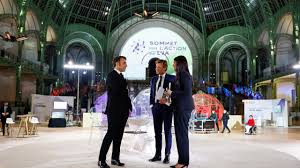Headlines
Paris AI Summit Begins, Spotlight on Geopolitical Implications

The highly anticipated Paris AI Summit kicks off this week, bringing together global leaders to discuss artificial intelligence’s impact on geopolitics and international security.
The geopolitics of artificial intelligence will take center stage at a significant summit in Paris on February 10-11. During this event, world leaders, executives, and experts will collaborate to forge agreements aimed at steering the development of this rapidly advancing technology.
This marks the latest in a series of international dialogues on AI governance, arriving at a pivotal moment as a new Chinese artificial intelligence model disrupts the industry.
French President Emmanuel Macron and Indian Prime Minister Narendra Modi are jointly hosting the event, which seeks to address how artificial intelligence can be utilized for the benefit of all while managing its numerous risks.
Attending the event will be U.S. Vice President JD Vance, China’s Vice Premier Ding Xuexiang, and European Commission President Ursula von der Leyen.
“We’re aware he’ll be present at the plenary to deliver a speech,” explained Nick Reiners, Senior Geotechnology Analyst at the Eurasia Group. “Given his past interventions, such as those at the Munich Security Conference, it’s plausible that he might adopt a rather combative tone.”
He added that this might weaken the possibility of reaching an agreement on a joint communiqué or any other significant outcome.
Prominent Silicon Valley figures, including OpenAI CEO Sam Altman, Microsoft President Brad Smith, and Google CEO Sundar Pichai will be in attendance.
AI risks remain a topic of discussion, as an expert group reports on the potential extreme dangers posed by general-purpose AI.
This time, however, the organizers are including more countries in the discussion and broadening the debate to encompass a variety of other AI-related topics.
As in past editions, the summit will not result in any binding regulations.
Macron’s team aims to redirect attention from the competition to create superior artificial general intelligence using vast computing power, and instead prioritize making data accessible for solving issues such as cancer or long COVID.
It is uncertain if Trump’s officials will approve any agreements at the summit.
Trump has expressed his ambition to establish the U.S. as the “world capital of artificial intelligence” by utilizing its oil and gas reserves to fuel this energy-intensive technology.
Last month’s release of Chinese AI startup DeepSeek’s chatbot was remarkable due to its ability to compete with Western counterparts such as ChatGPT.
Nevertheless, the emergence of DeepSeek, which developed its open-source AI model at a significantly lower cost and with fewer resources, aligns China’s interests with those of France.
Macron aims to challenge the dominance of U.S. AI companies and create opportunities for others, such as the French startup Mistral, which utilizes an open-source AI model.
Reiners remarked that France is intriguingly attempting to position itself between the U.S. and China, rather than fully aligning with the U.S., in an effort to gain leverage and showcase its strategic autonomy, a concept frequently emphasized by Macron.
For quite some time, Brussels has posed a significant challenge for major tech companies by imposing antitrust penalties on corporations such as Google, Apple, and Meta.
Last month at the World Economic Forum in Davos, Switzerland, Trump criticized the EU’s multibillion-dollar fines on American companies, describing them as a “form of taxation.”
Recently, the European Union’s artificial intelligence regulation has faced opposition from companies.
